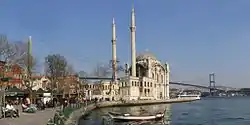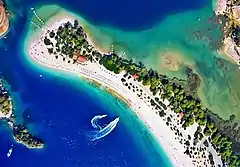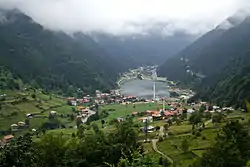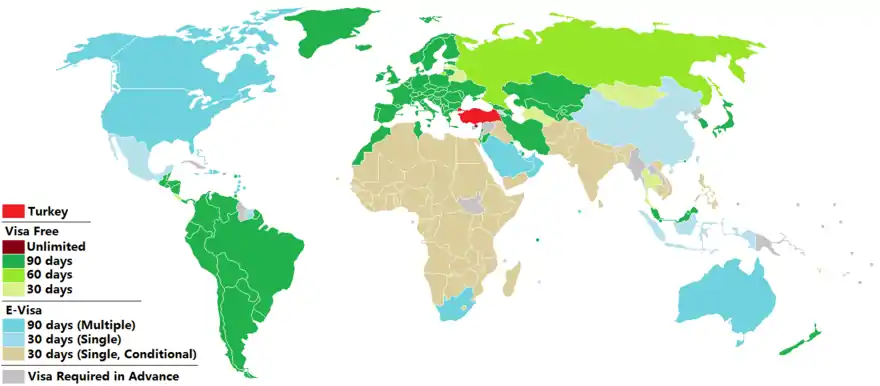Tourism in Turkey
Tourism in Turkey is focused largely on a variety of historical sites, and on seaside resorts along its Aegean and Mediterranean Sea coasts. Turkey has also become a popular destination for culture, spa, and health care.

At its height in 2019, Turkey attracted around 51 million foreign tourists,[1] ranking as the sixth-most-popular tourist destination in the world.[2] The total number fluctuated between around 41 million in 2015, and around 30 million in 2016.[3][4] However, recovery began in 2017, with the number of foreign visitors increasing to 37.9 million, and in 2018 to 46.1 million visitors[5][6][7]
Destinations
Istanbul


Istanbul is one of the most important tourism spots not only in Turkey but also in the world. There are thousands of hotels and other tourist-oriented industries in the city. Turkey's largest city, Istanbul has a number of major attractions derived from its historical status as capital of the Byzantine and Ottoman Empires. These include the Sultan Ahmed Mosque (the "Blue Mosque"), the Hagia Sophia, the Topkapı Palace, the Basilica Cistern, the Dolmabahçe Palace, the Galata Tower, the Grand Bazaar, the Spice Bazaar, and the Pera Palace Hotel. Istanbul has also recently become one of the biggest shopping centers of the European region by hosting malls and shopping centers, such as Metrocity, Akmerkez and Cevahir Mall, which is the biggest mall in Europe and seventh largest shopping center in the world. Other attractions include sporting events, museums, and cultural events.
In January 2013, the Turkish government announced that it would build the world's largest airport in Istanbul. The operation has an invested 7-billion euros and was planned to have the first part of a four-part plan completed by 2017.[8]
As a consequence of the continuous fall in tourism to Turkey in recent years, as of October 2016 in Istanbul's famous bazaar once crowded shopping streets are not as crowded as before, "the streams of tourists who used to visit the market each day have trickled to a halt."[3] The number of foreign tourists visiting Istanbul declined to 9.2 million in 2016, a 26 percent decrease compared to 2015.[9]
Other destinations

Beach vacations and Blue Cruises, particularly for Turkish delights and visitors from Western Europe, are also central to the Turkish tourism industry. Most beach resorts are located along the southwestern and southern coast, called the Turkish Riviera, especially along the Mediterranean coast near Antalya. Antalya is also accepted as the tourism capital of Turkey.[10] Major resort towns include Bodrum, Fethiye, Marmaris, Kuşadası, Çeşme, Didim and Alanya. Also Turkey has been chosen second in the world in 2015 with its 436 blue-flagged beaches, according to the Chamber of Shipping.[11]
Attractions elsewhere in the country include the sites of Ephesus, Troy, Pergamon, House of the Virgin Mary, Pamukkale, Hierapolis, Trabzon (where one of the oldest monasteries is the Sümela Monastery), Konya (where the poet Rumi had spent most of his life), Didyma, Church of Antioch, ancient Pontic capital and king rock tombs with its acropolis in Amasya, religious places in Mardin (such as Deyrülzafarân Monastery), and the ruined cities and landscapes of Cappadocia.
Diyarbakır is also an important historic city, although tourism is on a relatively small level due to waning armed conflicts.
Ankara has an historic old town, and although it is not exactly a tourist city, is usually a stop for travelers en route to Cappadocia. The city enjoys an excellent cultural life, too, and has several museums. The Anıtkabir is also in Ankara. It is the mausoleum of Atatürk, the founder of the Republic of Turkey.
Gallipoli and Anzac Cove – a small cove on the Gallipoli peninsula, which became known as the site of World War I landing of the ANZAC (Australian and New Zealand Army Corps) on 25 April 1915. Following the landing at Anzac Cove, the beach became the main base for the Australian and New Zealand troops for the eight months of the Gallipoli campaign.
Development of tourism

.JPG.webp)
.jpg.webp)


Foreign tourist arrivals increased substantially in Turkey between 2000 and 2005, from 8 million to 25 million, which made Turkey a top-10 destination in the world for foreign visitors. 2005 revenues were US$20.3 billion which also made Turkey one of the top-10 biggest revenue owners in the world. In 2011, Turkey ranked as the 6th most popular tourist destination in the world and 4th in Europe, according to UNWTO World Tourism barometer.[13] See World Tourism rankings. At its height in 2014, Turkey attracted around 42 million foreign tourists, still ranking as the 6th most popular tourist destination in the world.[2] From 2015, tourism to Turkey entered a steep decline.[14][15] In 2016, only around 30 million people visited Turkey. 2016 is described as the second year of huge losses on both visitor numbers and income, a "year of devastating losses", with Turkish tourism businesses stating that they "cannot remember a worse time in the sector".[3] The number of foreign visitors started recovering in 2017 with 37.9 million visitors being recorded. The recovery was partly due to intense security campaigns and advertising. The number of Russian tourists increased by 444% after the recovery of bilateral relations, resulting in Russia becoming the top tourism market for Turkey once again.[5][6] Increases were also recorded in the British, Dutch and Belgian markets.[16]
In early 2017, the Turkish government urged Turkish citizens living abroad to take their vacations in Turkey, attempting to revive the struggling tourism sector[17] of an economy that went into contraction from late 2016.[18] After the April 2017 constitutional referendum, another sharp drop in tourist bookings from Germany was recorded.[19] In 2018, however, the German Tourism Industry Association recorded a growth in German tourist bookings for Turkey, with a 70% increase being recorded by the TUI Group alone.[20]
Foreign visitor arrivals
Most tourist arrivals in Turkey are from the following countries of nationality.[21][22][23][24][25]
| Rank | Country | 2019 | 2018 | 2017 | 2016 | 2015 |
|---|---|---|---|---|---|---|
| 1 | 3,649,003 | |||||
| 2 | 5,580,792 | |||||
| 3 | 1,821,480 | |||||
| 4 | 2,512,139 | |||||
| 5 | 1,700,385 | |||||
| 6 | 1,911,832 | |||||
| 7 | 706,551 | |||||
| 8 | 1,094,144 | |||||
| 9 | 1,232,487 | |||||
| 10 | 602,488 | |||||
| 11 | 550,779 | |||||
| 12 | 847,259 | |||||
| 13 | 755,414 | |||||
| 14 | 441,097 | |||||
| 15 | 798,787 | |||||
| 16 | 224,568 | |||||
| 17 | 450,674 | |||||
| 18 | 617,406 | |||||
| 19 | 162,866 | |||||
| 20 | 423,744 | |||||
| 21 | 624,649 | |||||
| 22 | 313,704 | |||||
| 23 | 486,044 | |||||
| 24 | 507,897 | |||||
| 25 | 197,552 | |||||
| 26 | 174,486 | |||||
| 27 | 408,841 | |||||
| 28 | 212,464 | |||||
| 29 | 380,338 | |||||
| 30 | 174,330 | |||||
| 31 | 171,873 | |||||
| 32 | 178,997 | |||||
| 33 | 246,245 | |||||
| 34 | 234,762 | |||||
| 35 | 204,355 | |||||
| 36 | 236,063 | |||||
| 37 | 143,331 | |||||
| 38 | 109,775 | |||||
| 39 | 131,869 | |||||
| 40 | 112,654 | |||||
| Total | 41,114,069 |
Issues of Turkish government image in tourist origin countries
The reason for the fall in tourism is attributed to a general increase in political violence, political tension with Russia, and terrorist attacks,[26][3] and to the bad image that the increasingly authoritarian policies of Recep Tayyip Erdoğan have given to Turkey.[27] As by Faruk Şen, head of the Turkish European Foundation for Education and Scientific Studies: "German tourists are not afraid of bombs; if fewer German tourists are now coming to Turkey, that is because of the country’s image. In Germany, if you say “I’m going to Turkey, this is now perceived meaning ‘I’m going to a dictator’s country.’”"[4]
After months of detention of journalists and political activists including foreigners in Turkey, the government of Germany in July 2017 issued a travel warning to its citizens.[28] It was also reported that Turkish president Recep Tayyip Erdogan had offered to release detained German citizens of Turkish descent in exchange for delivery of Turks who had been granted political asylum in Germany.[29]
Government policy and regulation
The AKP government has been promoting "halal tourism" for years,[30] politically reaffirming this stance over the course of 2016.[31] In March 2017, a Turkish court banned global travel fare aggregator website Booking.com from offering services to Turkish tourists for lack of a national licence,[32] while the Hoteliers Association of Turkey campaigns for a lifting the ban of the enterprise on which its members relied for up to 90 percent of their turnover.[33]
In April 2017, the police department of the prime resort city of Antalya issued a directive banning the consumption of alcohol outside of buildings.[34]
See also
References
- https://www.hurriyet.de/news_rekord-51-9-millionen-urlauber-besuchten-die-tuerkei-2019_143532281.html
- "42 million tourists visit Turkey in 2014". Daily Sabah. Retrieved 6 July 2016.
- "Turkey's tourism industry reels from a year to forget". The Guardian. 5 October 2016.
- "Turkish–German ties at historic low, says scholar Faruk Şen". Hürriyet Daily News. 21 November 2016. Archived from the original on 16 December 2019.
- "32.4 mln foreigners visit Turkey in 2017: Tourism Ministry". Hürriyet Daily News. Retrieved 12 February 2018.
- "Tourism in Turkey starts recovery". ITIJ. Retrieved 12 February 2018.
- "DISTRIBUTION OF ARRIVING FOREIGN VISITORS - TOP 5 COUNTRIES (2016-2018) JANUARY-DECEMBER".
- Maierbrugger, Arno (25 January 2013). "Turkey plans world's biggest airport". Inside Investor. Retrieved 17 May 2013.
- "Number of foreign tourists visiting Istanbul plunges for first time in 16 years". Hürriyet Daily News. 6 January 2017.
- Tilic, L. Dogan (5 April 2010). "Antalya: The Tourism Capital of Turkey". European Business Review. Retrieved 28 January 2011.
- "Turkey rich in 'blue flags' – TRAVEL". Hürriyet Daily News. 13 September 2011. Retrieved 15 October 2016.
- "Capadocia" (PDF).
- "2012 Tourism Highlights" (PDF). UNWTO. June 2012. Archived from the original (PDF) on 9 July 2012. Retrieved 17 June 2012.
- Kafanov, Lucy (19 August 2015). "Violence costing Turkey precious tourism, even far from the fighting". The Christian Science Monitor.
- "4.9 pct less tourists in Turkey in June". DailySabah. Retrieved 15 November 2015.
- "It is now time for Turkey's tourism sector to raise revenue". Hürriyet Daily News. Retrieved 12 February 2018.
- "Erdoğan calls on citizens abroad: 'Come to Turkey for vacation'". Hürriyet Daily News. 2 February 2017. Retrieved 2 February 2017.
- "Turkey's Economy Contracts for First Time Since 2009". The Wall Street Journal. 12 December 2016. Retrieved 2 February 2017.
- "German travelers booking in Spain, Greece instead of Turkey: Association". Hürriyet Daily News. 21 April 2017.
- "Turkey hopes for German comeback". FVW. Retrieved 12 February 2018.
- Ministry of Culture and Tourism, Republic of Turkey. "Number of Arriving-Departing Foreigners and Citizens, December 2016". Retrieved 16 May 2017.
- NUMBER OF ARRIVING-DEPARTING VISITORS, FOREIGNERS AND CITIZENS December 2017
- "DISTRIBUTION OF ARRIVING FOREIGN VISITORS - TOP 5 COUNTRIES (2016-2018) JANUARY-DECEMBER".
- "Tourism Receipts-Expenditures (2003-2019)".
- https://www.ktb.gov.tr/EN-249306/2019.html
- "Turkish 2015 tourism revenues fall 8.3 pct to $31.46 bln: Data". Hürriyet Daily News. Retrieved 6 July 2016.
- "Ahead of referendum, Europeans boycott Turkey and tourism suffers". USA Today. 15 April 2017.
- "Bundesregierung verschärft Reisehinweise für Türkei" (in German). DER SPIEGEL. 20 July 2017.
- "Erdogan soll Austausch von Yücel gegen Ex-Generäle angeboten haben" (in German). DER SPIEGEL. 20 July 2017.
- "Turkey sees rise in halal tourism". BBC. 25 August 2014.
- "How Turkey plans to boost halal tourism". Al Monitor. 9 May 2016. Archived from the original on 17 January 2018. Retrieved 28 April 2017.
- "Turkey has banned Booking.com but the website isn't backing down". The Independent. 30 March 2017.
- "Turkish hotelier association asks court to lift ban on Booking.com". Hürriyet Daily News. 6 April 2017.
- "Statement on alcohol ban in outdoor locations in Turkey's Antalya sparks debate". Hürriyet Daily News. 28 April 2017.
External links
| Wikivoyage has a travel guide for Turkey. |
| Wikimedia Commons has media related to Tourism in Turkey. |
.jpg.webp)

